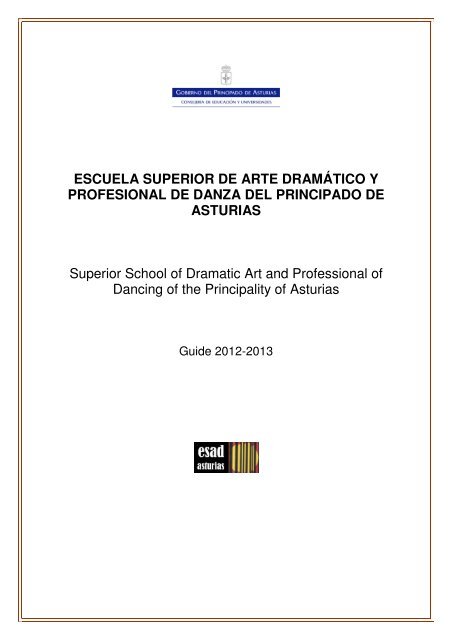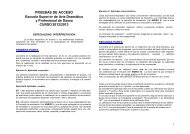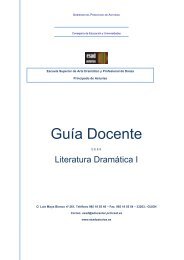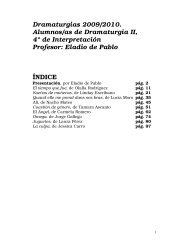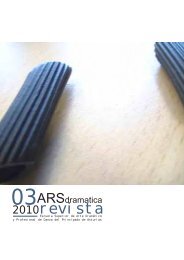ESCUELA SUPERIOR DE ARTE DRAMÁTICO Y PROFESIONAL ...
ESCUELA SUPERIOR DE ARTE DRAMÁTICO Y PROFESIONAL ...
ESCUELA SUPERIOR DE ARTE DRAMÁTICO Y PROFESIONAL ...
You also want an ePaper? Increase the reach of your titles
YUMPU automatically turns print PDFs into web optimized ePapers that Google loves.
<strong>ESCUELA</strong> <strong>SUPERIOR</strong> <strong>DE</strong> <strong>ARTE</strong> <strong>DRAMÁTICO</strong> Y<br />
<strong>PROFESIONAL</strong> <strong>DE</strong> DANZA <strong>DE</strong>L PRINCIPADO <strong>DE</strong><br />
ASTURIAS<br />
Superior School of Dramatic Art and Professional of<br />
Dancing of the Principality of Asturias<br />
Guide 2012-2013
WELCOME<br />
Welcome to the Superior School of Dramatic Art and Professional of Dancing of<br />
the Principality of Asturias (Escuela Superior de Arte Dramático y Profesional<br />
de Danza – ESAD and PD). Since 2002 our school creates professionals of<br />
performance through teaching which develops in an integrated manner artistic,<br />
scientific and technological skills.<br />
At present one can take at the ESAD and PD of Asturias superior studies of<br />
Dramatic Art, specializing in Acting and the professionals of Dancing can<br />
specialize inClassical Dancing.<br />
The Superior School of Dramatic Art and Professional of Dancing of the<br />
Principality of Asturias is also a nucleus of documentation, investigation,<br />
promotion and diffusion of theatre in itself. Those who choose to enter the<br />
ESAD ASTURIAS will find a centre that has the best conditions for not just an<br />
adequate training but an excellent one. These conditions are:<br />
1. ESAD ASTURIAS is a public centre and is therefore open to all kinds of<br />
students without taking into account their socioeconomic standard.<br />
2. Its Dramatic Art Studies have the level of degree and are within what is<br />
established in the European Space of Superior Education agreements.<br />
3. The student entrance test allows a restricted number of students per class<br />
and group: 12 for practice subjects and 24 for theory subjects.<br />
4. The opening timetable of the centre (from 8:00 to 21:30) allows the students<br />
to have access to resources and classrooms to do their independent work.<br />
5. Since the academic year 2006/2007 ESAD ASTURIAS is found at the noble<br />
building of the Laboral University and it is part of the magnificent Project<br />
Laboral, city of culture: a complex made up of the Laboral Theatre, the Modern<br />
Art and Industrial Creation Centre and the Professional Conservatory of Music.<br />
6. ESAD ASTURIAS students have access to wonderful facilities: 20<br />
classrooms of suitable dimensions (voice, acting, dancing, corporal expression,<br />
theory, etc.); two theatres, one in the school and the other being the Laboral<br />
Theatre. The Laboral Theatre has recently been reformed and turned into one<br />
of the best theatres in Spain with a seating capacity of 1200.<br />
7. Twenty-seven teachers make up the staff.
HISTORY<br />
In 2002 the Superior School of Dramatic Art of the Principality of Asturias is<br />
created. Later on, in 2009 Professional Studies of Dancing are added becoming<br />
then the Superior School of Dramatic Art and Professional of Dancing. Since<br />
then various classes with a large number of superior professional graduates in<br />
Dramatic Art have emerged. These graduates develop their artistic work not<br />
only in Asturias but also in the rest of Spain and other places around the world.<br />
In 2010 our School enters the European Space of Superior Education. Allowing<br />
us to design studies in ECTS credits, establish post graduate courses (master’s<br />
degree and PhD) and develop and reinforce the ERASMUS programme,<br />
consolidate projects with other centres or entities, as well as other encounters<br />
and exchanges (OLIVE: Meeting of Mediterranean Theatre Schools), literary<br />
routes, collaborations with the Professional Conservatory of Music of Gijon, end<br />
of degree work exchanges with other schools, etc… The Framework of Laboral,<br />
city of culture means ideal facilities for teaching Dramatic Art. The remodelling<br />
of the building has given us extraordinary scenic and pedagogical spaces for<br />
the new conception of Art in the 21 st century.<br />
www.laboralciudaddelacultura.com<br />
MAIN VENUE<br />
The Laboral University is the building where the ESAD and PD ASTURIAS<br />
permanent main venue is located. It is on the outskirts of Gijon, in a landscape<br />
of great beauty allowing total independence and other possibilities such as<br />
exterior areas, very good for outdoor activities. It also has a parking with 300<br />
spaces.<br />
The building has 4 floors and a usable surface of more than 5.000 square<br />
metres and has the following spaces:<br />
Level - 1, scenography workshop and classroom- clothes storage.<br />
Level 0, main Entrance to the school: the Alejandro Casona hall, theatre with a<br />
capacity for 100 spectators and mobile<br />
stands which allow usage of space in the<br />
Italian way, circular, etc. On this level, the<br />
Étienne Decroux room is also found where<br />
movement subjects are given, as well as<br />
the Manuel de Falla room for voice, music<br />
and singing subjects. Lastly, the Director’s<br />
Office, Head of Studies, Secretary, the<br />
Artistic Promotion Department,<br />
Administration and Council for Education<br />
are also located on this floor.
Level 1, this floor is composed of the library, video<br />
library, the Movement classrooms Marta Graham and<br />
Rudolf Laban, 3 Theory classrooms, 3 Voice<br />
classrooms, an Acting classroom El Público, the<br />
Staffroom and 6 departments: Acting, Direction, Drama,<br />
Voice, Movement and Artistic Promotion.<br />
Level 2 has the Computer Science classroom and the<br />
Rehearsal room, El tragaluz.<br />
Level 3: Auditoriums Giorgio Strehler, Cipriane Rivas<br />
Cheriff and Clara Ferrer, the Acting classrooms La<br />
Celestina and La Gaviota and one Theory classroom.<br />
The Characterization (make up) classroom is located<br />
higher up, in one of the towers.<br />
The students also have a place where they can eat.<br />
Laboral, city of culture.
DIRECTORY<br />
Council for Education: Call Centre: Tel: (+34) 985 18 55 40<br />
Director<br />
Eladio de Pablo López<br />
esad-dir@educastur.princast.es<br />
Tel: (+34) 985 18 55 41<br />
Administration<br />
Mª Dolores Vega del Valle<br />
esadadministracion@educastur.princast.es<br />
Tel: (+34) 985 18 55 44<br />
Interpretation Department<br />
Head of Department:<br />
Enrique López Fernández<br />
esadinterpretacion@educastur.princast.es<br />
esad.interpretacion@gmail.com<br />
Tel: (+34) 985 18 55 48<br />
Direction Department<br />
Head of Department:<br />
Miguel S. Cegarra<br />
esad-direccion@educastur.princast.es<br />
esad.direccion@gmail.com<br />
Tel: (+34) 985 18 55 50<br />
Movement Department<br />
Head of Department:<br />
Ana María Pérez de Amézaga<br />
esad-movimiento@educastur.princast.es<br />
esad.movimiento@gmail.com<br />
Tel: (+34) 985 18 55 52<br />
Teaching Secretary<br />
Begoña Martínez Cezón<br />
esad-secre@educastur.princast.es<br />
Tel: (+34) 985 18 55 45<br />
Head of Studies<br />
Joaquín Amores<br />
esad-jefatura@educastur.princast.es<br />
Tel: (+34) 985 18 55 46<br />
Administration<br />
Carmen Migoya Guijarro<br />
esad-administracion@educastur.princast.es<br />
Tel: (+34) 985 18 55 42<br />
Drama Department<br />
Head of Department:<br />
Leopoldo García-Pumarino<br />
esad-dramaturgia@educastur.princast.es<br />
esad.dramaturgia@gmail.com<br />
Tel: (+34) 985 18 55 49<br />
Voice Department<br />
Head of Department:<br />
Ana Gil Aledo<br />
esad-voz@educastur.princast.es<br />
esad.voz@gmail.com<br />
Tel: (+34) 985 18 55 51<br />
Magazine Ars Dramatica<br />
esad-arsdramatica@educastur.princast.es
Artistic Promotion Department<br />
Head of Department:<br />
Nora Casella López<br />
esad-artisticas@educastur.princast.es<br />
esadasturiascomunicacion@gmail.com<br />
STUDY PLANS<br />
International Relations. Erasmus<br />
Coordinator:<br />
Francisco Pardo Almansa<br />
esad-erasmus@educastur.princast.es<br />
erasmusesadasturias@gmail.com<br />
Tel: (+34) 620672865<br />
ESAD ASTURIAS gives superior degree education in 4 years. The study plan<br />
has 4 academic years, 60 credits each one, with a total of 240 credits.<br />
The profile defined in the speciality of Acting corresponds to an artist, creator,<br />
interpreter and a communicator of signs using him/herself as an instrument;<br />
integrating his/her expressive resources, body, voice and cognitive and<br />
emotional resources while placing all of this at the service of the show. A<br />
personal artistic vision combined with other artist’s visions is developed while<br />
participating in the same artistic project. This professional will be prepared for<br />
the exercise of investigation and teaching.<br />
The Dramatic Art graduates in the speciality of Acting should have the following<br />
specific skills at the end of their studies:<br />
- Know the necessary expressive resources well so as to develop the<br />
performance.<br />
- Take part in the creation and interpret the score and / or role using their<br />
knowhow of different performance techniques.<br />
- Interact with the other languages that make up the show.<br />
- Study to conceive and consolidate the personal creative process not only<br />
what is related to work methodology but also to the updating of<br />
aesthetics.<br />
At present we have one speciality, Acting within the framework of the<br />
Agreement of Bologna. With the previous study plan, from the academic year<br />
2012-2012 onwards 4th years of Acting will be taken at the ESAD and PD of<br />
Asturias.<br />
According to the legislation in force (Ley Orgánica 2/2006), a calendar of<br />
application of the new organization of the education system is established.<br />
Therefore, the progressive implementation of the superior artistic education<br />
graduates in Dramatic Art will begin in the academic year 2012-2013. All this is<br />
regulated by the present royal decree and in the first year we will work with<br />
European credits (ECTS).<br />
The academic load emphasizes not just an eminently practical teaching but<br />
another much more theoretical. This way the cultural intellectual knowledge<br />
theorypractice consolidates a solid academic formation and prepares the future
candidate for the investigation and creation in the different areas of his / her<br />
speciality.<br />
The evaluation of the student’s learning process will be based on the degree<br />
and level of acquisition and consolidation of the defined competitions for those<br />
studies.<br />
The evaluation will be divided in subjects. It will have a joining character related<br />
to the defined competitions for each one in the study plans. The evaluation and<br />
grading of the end of degree work will be unique. Passing it means that one has<br />
passed all of the subjects that make up the study plans.<br />
The evaluation criterions are objective and measurable according to the<br />
parameters defined in the study plans. To obtain the title of Graduate in<br />
Dramatic Art one must have passed all of the subjects. Practice subjects if<br />
programmed and the end of degree work.<br />
Negative marks in three or more subjects will impede the student from<br />
promoting to the next year. Students have 4 exam periods to pass each subject.<br />
The student cannot remain at the centre for more than 6 academic years.<br />
The Acting Speciality gives the necessary theory and technical knowledge to<br />
the student to become a specialist in the dramatic art field as a professional<br />
theatre, film or television actor. The speciality of interpretation has 4 areas to<br />
cover, one which is now being given at ESAD ASTURIAS: Textual Acting.
PRIMER CURSO<br />
TEXTUAL ACTING<br />
according to L.O.E. (Ley orgánica de educación, 2006).<br />
• Interpretación I 14 ECTS<br />
• Teoría de la Interpretación 5 ECTS<br />
• Técnica Vocal I 7 ECTS<br />
• Teoría y Práctica del verso 6 ECTS<br />
• Lenguaje Musical 5 ECTS<br />
• Expresión Corporal 8 ECTS<br />
• Literatura dramática I 4.5 ECTS<br />
• Fundamentos y Prácticas del Movimiento 3.5 ECTS<br />
• Historia de las Artes Espectáculares 3.5 ECTS<br />
• Caracterización 3.5 ECTS<br />
SEGUNDO CURSO<br />
• Interpretación II 13 ECTS<br />
• Taller teatro Siglo de Oro 6 ECTS<br />
• Técnica vocal II 7ECTS<br />
• Lenguaje musical y Canto 6.5 ECTS<br />
• Danza I 4.5 ECTS<br />
• Esgrima 5 ECTS<br />
• Historia de las Artes Espectaculares II 3.5 ECTS<br />
• Indumentaria 3.5 ECTS<br />
• Literatura dramática II 4 ECTS<br />
• Teoría e historia del arte 4 ECTS<br />
• Optativa 1 3 ECTS<br />
TERCER CURSO<br />
• Interpretación III 12 ECTS<br />
• Taller teatro Contemporáneo 7 ECTS<br />
• Expresión Oral I 6.5 ECTS<br />
• Canto 5.5 ECTS<br />
• Acrobacia y lucha espectacular 4.5 ECTS<br />
• Danza II 5 ECTS<br />
• Iniciación a la dirección escénica 5 ECTS<br />
• Teoría y práctica de la escritura dramática 5 ECTS<br />
• Semiología teatral 3.5 ECTS<br />
• Optativa 2 3 ECTS<br />
• Optativa 3 3 ECTS
According to L.O.G.S.E. (Ley orgánica de ordenación general del sistema<br />
educativo, 1990)<br />
CUARTO CURSO<br />
• Interpretación IV 360 h 20 ECTS<br />
• Expresión Oral II 90 h 4 ECTS<br />
• Canto II 90 h 4 ECTS<br />
• Dramaturgia II 90 h 12 ECTS<br />
• Escenografía 90 h 12 ECTS<br />
• Caracterización 90 h 4 ECTS<br />
• Indumentaria 90 h 4 ECTS<br />
If mobility refers to a single semester, the student will complete half of ECTS<br />
credits for each subject chosen in the selected semester. Having two testing<br />
dates for this purpose, one in February and one in June.<br />
ARS DRAMATICA, THE MAGAZINE OF ESAD ASTURIAS<br />
Ars Dramatica is the magazine of the Superior School of Dramatic Art and<br />
Professional of Dancing of the Principality of Asturias.<br />
With a yearly release it has already published numbers 00, 01, 02 and 03. Its<br />
editorial council is made up of 5 teachers and 2 students. The average print run<br />
is about 1.000 copies.<br />
These are given out free or charge amongst the staff and students of the<br />
school, institutes of secondary education in Asturias, professional companies<br />
and Asturian amateurs, national theatre magazines, theatres and alternative<br />
theatres, juvenile organizations, universities, etc.<br />
“Ars Dramática” was born with the intention of being a window where teachers<br />
and students from ESAD and other schools or universities, as well as artists,<br />
creators and professionals of Scenic Arts can capture their reflexions on this<br />
and on present theatre, establishing a rich dialogue for all.
At present the magazine has five sections:<br />
- Pedagogical space: dedicated to ideas and opinions of a pedagogical<br />
nature.<br />
- School activities are also referred to in this section.<br />
- Asturias stage: refers to theatre activities of Asturian companies.<br />
- News: it reviews all that has been of interest within the school and outside<br />
as well as in and outside of Asturias.<br />
- Texts: invitation to publish texts with a limited duration.<br />
- Requexu: this is the corner where opinions or creations of a diverse<br />
nature can be found.<br />
Ars Dramatica is managed by the Editorial Council, found within the Artistic<br />
Promotion Department. It is financed with school funds and a small advertising<br />
contribution.<br />
INTERNATIONAL RELATIONS<br />
The area of International Relations, part of the Artistic Promotion Department, is<br />
the nexus of ESAD ASTURIAS with other countries, especially with European<br />
Centres and Institutions.<br />
ESAD ASTURIAS is part of the OLIVE project, Meeting of Mediterranean<br />
Theatre Schools. Here, students and teachers from different Mediterranean<br />
countries get together for a week to unify scenes from various authors and<br />
exchange knowledge.<br />
Since 2008, ESAD ASTURIAS has taken part in this event, celebrated every<br />
year in the month of September in different European countries. ESAD<br />
ASTURIAS aspires to become the main venue for OLIVE 2012.<br />
The Erasmus programme is also managed from the area of International<br />
Relations. It establishes contacts with European Superior Schools of Dramatic<br />
Art and gives advice to students who are interested in participating in this<br />
enriching experience.<br />
Many artists visit us at Laboral, city of culture. Our students have the chance to<br />
work closely with creators from all places around the world helping in staging,<br />
courses and workshops.<br />
These activities are arranged by the International Relations Area.
ERASMUS<br />
The Erasmus grants allow students of the Superior School of Dramatic Art and<br />
Professional of Dancing of second, third or fourth year of the studies of<br />
Dramatic Art in Textual Acting. 3-12 months in European Schools of Dramatic<br />
Art with whom they have signed an agreement to collaborate.<br />
The Erasmus Grant only covers one monthly assignment. Students do not have<br />
to pay any registration fee at the centre where they are assigned. However,<br />
they must take on residence expenses, maintenance and travelling costs.<br />
VALIDATIONS<br />
Once the students have returned from Europe they must show the projects<br />
done abroad to their respective specialities.<br />
Once the period of the study grant has finished, the Superior School of<br />
Dramatic Art and Professional of Dancing of the Principality of Asturias will<br />
receive from the respective European Schools the accreditation of the marks<br />
obtained by each Erasmus student.<br />
These marks will be object to examination and therefore, of validation by<br />
subjects and workshops of the Superior School of Dramatic Art and<br />
Professional of Dancing of the Principality of Asturias programme. Even so, the<br />
Pedagogic Coordination Board together with the knowledge and confirmation of<br />
the Specialities, Departments and Head of Studies will have to make these<br />
validations effective by signing the correspondent acts.<br />
The Erasmus Programme Coordinator will give additional information to those<br />
students who should require it.<br />
STU<strong>DE</strong>NTS WHO COME TO ESAD ASTURIAS<br />
Each academic year ESAD ASTURIAS will receive the proposals of Erasmus<br />
students from European Schools for the next academic year.<br />
Regarding these proposals the Specialities will study the Erasmus students’<br />
adaptation to the spaces of our centre, as well as the pedagogic aspects<br />
(groups, timetables, work topics, etc.)<br />
Having taken into consideration these proposals the Specialities will then accept<br />
them. The acceptance will be communicated to the schools and then to the<br />
candidates by the Artistic Promotion Department with enough time for them to<br />
prepare.<br />
The European students will receive information on the ESAD ASTURIAS<br />
programme with enough time in advance. They will also be given information on<br />
the city of Gijon and possible accommodations.
European students will be received at ESAD ASTURIAS by the Erasmus<br />
Programme Coordinator, who will explain how the school works and will<br />
introduce them to their corresponding speciality.<br />
The documentation and procedures for Erasmus mobility are in the international<br />
relations section of the website.<br />
STU<strong>DE</strong>NTS WHO GO ABROAD<br />
ESAD ASTURIAS in each academic year will open a presentation period for<br />
proposals of those students who would like to study in Europe. ESAD<br />
ASTURIAS will also give a meeting with information on the requirements,<br />
agreements with other schools and complementary information about the<br />
ERASMUS programme.<br />
Within this period the applications for the next year will be completed and send<br />
to the assigned universities. These proposals will have the different options of<br />
the ESAD ASTURIAS students interested in studying in Europe.<br />
Regarding the proposals, ESAD ASTURIAS will wait for the response and<br />
acceptance of the candidates by the different European Schools which they<br />
have agreements with.<br />
All the necessary documentation and registration to study in Europe the next<br />
academic year will be dealt with once the confirmation has been received.<br />
Upon the arrival of the ERASMUS student to the Superior School in Europe, he<br />
/ she will be received by the Erasmus Coordinator of the mentioned entity. The<br />
Erasmus Coordinator will be the student’s contact and tutor while abroad as<br />
well as the Erasmus Coordinator of ESAD ASTURIAS.<br />
Just because a candidacy has been presented it does not mean that the grant<br />
will be given or that the student will be accepted by the accepting-assigned<br />
Superior School.
ERASMUS.<br />
Declaration of European Policy of ESAD ASTURIAS Erasmus Policy<br />
Statement (EPS)<br />
OBJECTIVES<br />
- Give priority to the exchanges as an initiative to opening up to the<br />
European Community.<br />
- Fulfil the fundamental principles of the Erasmus mobility.<br />
- Promote mobility through the elimination of obstacles to make the right of<br />
free<br />
circulation effective.<br />
- Promote the European cooperation with regards to quality, in order to<br />
develop<br />
comparable criterions and methodology.<br />
- Promote the elaboration of study programmes, cooperation between<br />
institutions,<br />
mobility programmes, integrated studies programmes, formation and<br />
investigation.<br />
- Guarantee quality, transparency, equality, integration, adequate<br />
information,<br />
acknowledgement, advertising and respect towards the policy and all that<br />
regards the Erasmus activities in our institution.<br />
- Start the process of founding the European Credit Transfer System (ECTS)<br />
in<br />
our centre.<br />
- Begin the mobility of students and teachers with European countries of<br />
Superior<br />
Artistic Education from different countries during the academic year 2011 /<br />
2012.<br />
- Encourage the values found in the Declaration of Bologna and this way<br />
contributes to the construction of European Space of Superior Education.<br />
STRATEGIES<br />
- Widen these horizons of exchange to other cultures.<br />
- Establish contacts with various Superior Centres of Artistic Teaching from<br />
European countries.<br />
- Encourage permanent learning programmes for both teachers and<br />
students.<br />
- Promote the knowledge of other languages.<br />
- Establish educational development projects with other institutions.<br />
- Find the possibility of having work experience in the professional world.<br />
- Find partner institutions wanting to share projects of pedagogic<br />
investigation.<br />
- Establish contacts with sponsoring financial entities.
- Adopt measures of transparency and updating regarding information on the<br />
curriculums. Also include the studies plan on the web page and the<br />
processes of<br />
acknowledgement of the activities of the Erasmus programme.<br />
- Organize a reception and accommodation plan for the students who are<br />
taken in.<br />
PRIORITIES<br />
- Be integrated in the European Erasmus Network of Superior Centres of<br />
Artistic<br />
Teaching through the actions of mobility within the Permanent Learning<br />
Programme.<br />
- Found the European Credit System (ECTS) for the academic year 2010 -<br />
2011.<br />
- Increase the economic resources for projects through agreements with<br />
local,<br />
regional authorities and private companies.<br />
- Make quality mobility, significant regarding our number of students;<br />
respecting<br />
the principles and adopting the necessary measures and strategies to<br />
become a<br />
referral point in Erasmus mobility within the framework of the Superior<br />
Centres<br />
of Artistic Teaching.<br />
- Attract a large number of foreign students and teachers.<br />
- Encourage the investigation about different educational aspects.<br />
- On the one hand, develop synergies between areas of education and<br />
vocational<br />
formation and on the other, culture with the support of transversal projects.<br />
- Advertise the Erasmus Programme in brochures of the centre.<br />
- Advertise EPS on the web page and in the Secretary’s Office.<br />
- Announce on a specific board exams, destinations and other actions within<br />
the<br />
programme.<br />
- Inform the staff teachers and students using the school magazine,<br />
meetings, email<br />
and web page.<br />
- Request information to specialized centres concerning education for<br />
disabled<br />
people to help the teaching staff whenever necessary.<br />
- Encourage social cohesion, fight against xenophobia and racism doing<br />
joint<br />
activities.
HOW TO GET THERE. CONTACT.<br />
Superior School of Dramatic Art and Professional of Dancing of the<br />
Principality of Asturias<br />
www.esadasturias.es<br />
Laboral University. C/ Luis Moya Blanco, 261<br />
33203. Gijón. Asturias. Spain.<br />
Accesses Telephone<br />
(+34) 985 18 55 40<br />
Fax (+34) 985 18 55 54<br />
e-mail: esad@educastur.princast.es<br />
INTERNATIONAL RELATIONS<br />
erasmusesadasturias@gmail.com


